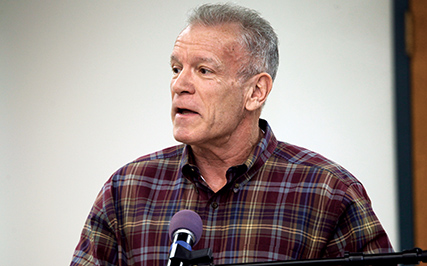Tribal Government & News
Education briefs General Council

The Tribe’s Education Department offers educational opportunities to Tribal members from preschool through graduate school, interim Education Department Manager John Harp said during a briefing of the membership at the Sunday, Jan. 4, General Council meeting held in the Community Center.
Harp said current Tribal students range from children attending preschool to a 72-year-old Elder pursuing a college degree.
The Tribe’s Education Department is made up of several divisions – Early Childhood Education, Youth Education and Post-Secondary/Higher Education.
Harp said about 40 children are currently enrolled in Head Start and 23 are in the K-5 Chinuk Wawa Immersion Program. About 15 to 25 Tribal youth in sixth through 12th grades take advantage of Youth Education’s afterschool offerings and about 80 students receive tutoring assistance.
Harp said more than 600 Tribal members annually are enrolled in Higher Education, seeking some sort of post-secondary degree or certificate.
Harp said the Education Department added a new position in 2015, a Family Services coordinator, whose goal will be to help connect Tribal families with area schools to help improve attendance by and teaching of Tribal students.
Harp said the Tribal Library issued 105 new library cards in 2014 and had 6,745 patron visits.
For 2015, Harp said the Education Department seeks to hire a new department manager, expand its recreation and fitness program and expand its kindergarten through fifth-grade program.
"And I hope to get my old job back,” Harp said about filling in as department manager and returning to being the Continuing Education coordinator.
After Harp’s presentation, Health & Wellness Business Office Manager Tresa Mercier and Certified Application Assister Loretta Meneley briefed the general membership on the Affordable Care Act and how it affects Tribal members.
By applying for alternative health insurance through the act, which is popularly known as Obamacare, Tribal members are helping to save Tribal dollars since the Skookum Health Assistance Program is not insurance. By having another first payer for medical expenses, the Tribe can make its Contract Health Services and Skookum funding go further.
By applying, Meneley said, Tribal members in Oregon can either qualify for the Oregon Health Plan or obtain health insurance on the marketplace. With a possible tax credit depending on income, health insurance could cost Tribal members little or nothing.
“By enrolling in Medicaid, CHIP (Children’s Health Insurance Program) or a QHP (qualified health plan), we are helping the IHS (Indian Health Service) and Tribal providers by bringing precious resources that can be used to care for others in the Tribe,” Meneley said.
For more information about the Affordable Care Act and how it affects your situation, contact Meneley at 503-879-1359.
In other action, Eric Bernando, Sean Gerbrandt and Elder Gladys Hobbs won the $50 door prizes and Lise Alexander won the $100 door prize. Necklaces created by Tribal Council member Jon A. George and crocheted items donated by Veronica Gaston also were raffled off.
Duane Wheeler, Jenny Van Atta and Julie Duncan were elected to the Elders Committee. Voting closed at 12:30 p.m. Sunday.
Grand Ronde Food Bank Coordinator Francene Ambrose reported that the new food bank at 9675 Grand Ronde Road received 514 pounds of donations during the recent food drive, including 164 pounds of protein. She encouraged any interested Tribal members to volunteer to work at the food bank. Ambrose can be contacted at 503-879-3663 or fambrose@marionpolkfoodshare.org.
Land and Culture Department employees Jan Looking Wolf Reibach and Brian Krehbiel opened the meeting with cultural drumming and singing to honor Tribal veterans, and they were joined by Jade Unger to sing a blessing song for the Tribe’s ceremonial hunters.
Ceremonial Hunting Board Chairwoman Marline Groshong said about 30 Tribal members perform the ceremonial hunts that provide traditional game for meals. In 2014, the hunters harvested four deer and three elk, she said. Hunts occur between January and August, she added.
Groshong said the animal hides are kept and made available to Tribal members who want to use them to make regalia.
The next General Council meeting will be held at 11 a.m. Sunday, Feb. 1, in the Community Center.
The meeting, in its entirety, can be viewed on the Tribal website, www.grandronde.org, under the Video shortcut.
